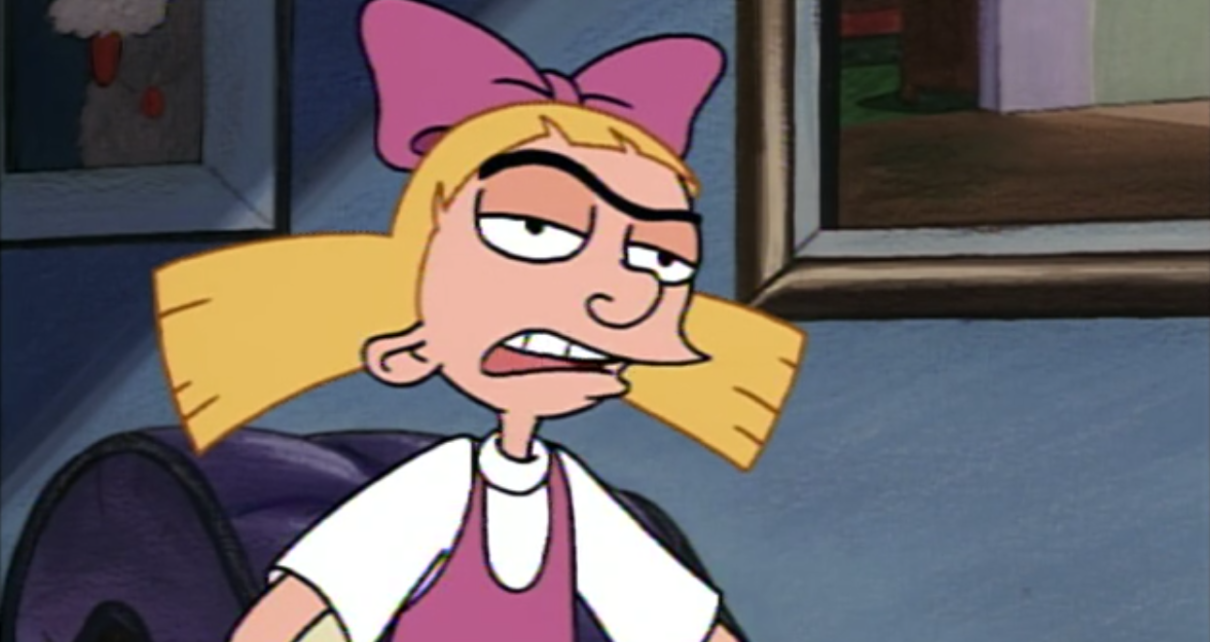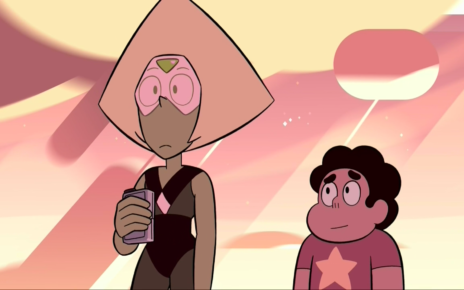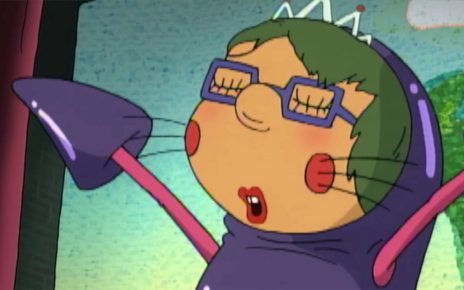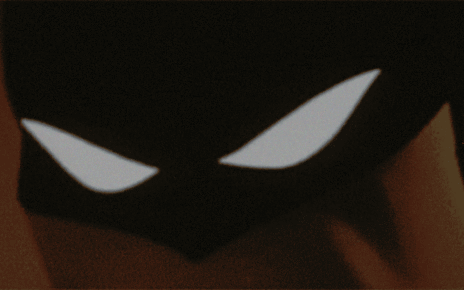From The Sopranos to Animaniacs, the patient-goes-to-therapy trope is textbook television. It’s not as common in shows made for children, though—and that’s part of what makes the Hey Arnold! episode “Helga on the Couch,” where Helga sees a child psychologist, so refreshing. One of Hey Arnold!’s secret weapons was always Helga’s dynamic passion—contrasted with Arnold’s ocean of serenity—and never was that better represented on the show than in this episode. In honor of Nicktoons Month!, join me and Helga on the couch.
The Set-Up
It’s just another normal day at school. Helga G. Pataki, school bully, marches through the halls looking for prey to take her frustrations out on. She hits like Brainy, who’s been breathing down her neck for four seasons. She fires spitballs at Arnold. She makes no effort to hide her problems with authority. None of this is new. It’s the Helga we know. It’s also the Helga who secretly pines after her beloved Arnold.
Only today things are different. A wild card has been tossed into the deck in the form of Dr. Bliss, a “child psychologist” (accompanied by air quotes from Mr. Simmons, who is clearly nervous that Dr. Bliss will out him as gay). Bliss immediately catches onto Helga’s disruptive behavior and signs her up for counseling sessions.
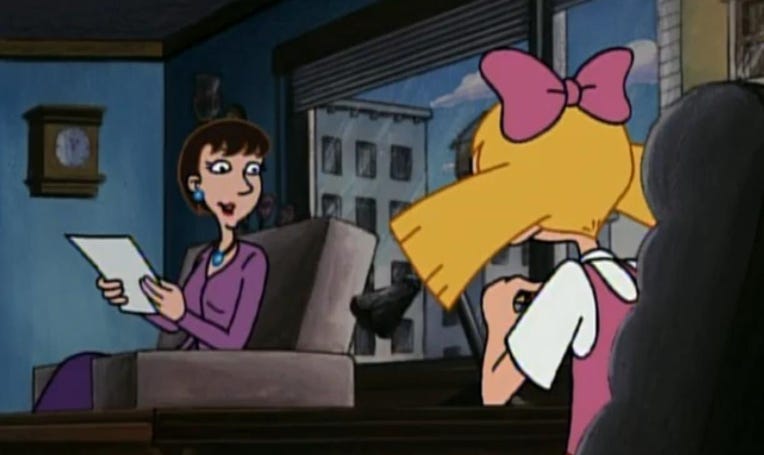
The Tension
Helga, of course, is on the defensive about all of this. And her parents aren’t much more supportive (more on them soon), but she goes to therapy regardless. The going gets good once Helga gets into Dr. Bliss’s office, and they start talking. The episode’s even-handed script, written and directed by series creator and showrunner Craig Bartlett and based on a story by Bartlett and Steve Viksten, does a lot to establish Helga as intelligent and cultured…
HELGA: “Nice picture. You like Edward Hopper.”
DR. BLISS: “I do.”
HELGA: “Yeah, he’s OK. He’s a little simple, though. And what’s his deal with women anyway?”
…even as it makes her anger issues clear. As you watch it, you kind of wonder, Why are we watching Helga go through this? Where is Arnold? He’s the one the show’s named after!
But as we learn over the course of flashbacks and through Helga and Dr. Bliss’s slowly tightening rapport, Helga has a lot to be angry about. Her mother’s an alcoholic. (No joke.) Her father is enamored with his beeper empire and his older daughter to the point where he forgets Helga’s name. This snowballs into a tragic inferiority complex for Helga. Family encounters devolve into neglect bordering on child abuse that wouldn’t look out of place in a Charles Dickens novel if there wasn’t—I swear to all things good—a cheesy laugh track lightening the mood. Helga knows how messed up it all is, too, because she’s not a moron.
“Nobody in my house even knows I exist,” she confides in Dr. Bliss while throwing darts, almost all of which hit closer to the center the closer Helga gets to the truth. “They never listen to me. I think I’d go crazy if it wasn’t for Arno—”
And there’s the record scratch! Cue Helga’s panic.
The Pay Off
For several more minutes, Helga tries to stall and pretend Dr. Bliss doesn’t know something is up with her and Arnold. The audience learns more through another flashback, where it’s revealed that Helga’s family never even took her to her first day of preschool, choosing instead to watch Olga play the piano. Guess who was there, in the rain with an umbrella, complimenting her bow before either of them had lost their first baby teeth.
And so began the Arnold crush/hangup—a hangup Helga is just beginning to realize is linked to the love her family has failed to provide her with. It’s what allows her to finally boil over in a shouted proclamation of her adoration for Arnold, one she demands her therapist keep to herself, upon pain of death. Dr. Bliss, of course, keeps her secret, because that’s what therapists do. (That’s what HIPAA laws are for!)
In the span of 90 seconds, Hey Arnold! has one of its main characters experience the cathartic release of a secret she’s held onto for years, exposes the root of a caustic darkness she’s carried her whole life, and simultaneously gives a thumbs up to mental health for children (and adults) everywhere. For all the clichéd psychoanalytical artifacts in the episode—the Rorschach test, the couch, the word association, the inhumanly rapid rapport between Helga and Dr. Bliss—that Bartlett and Co. could pull this off at all is testament to their genius.
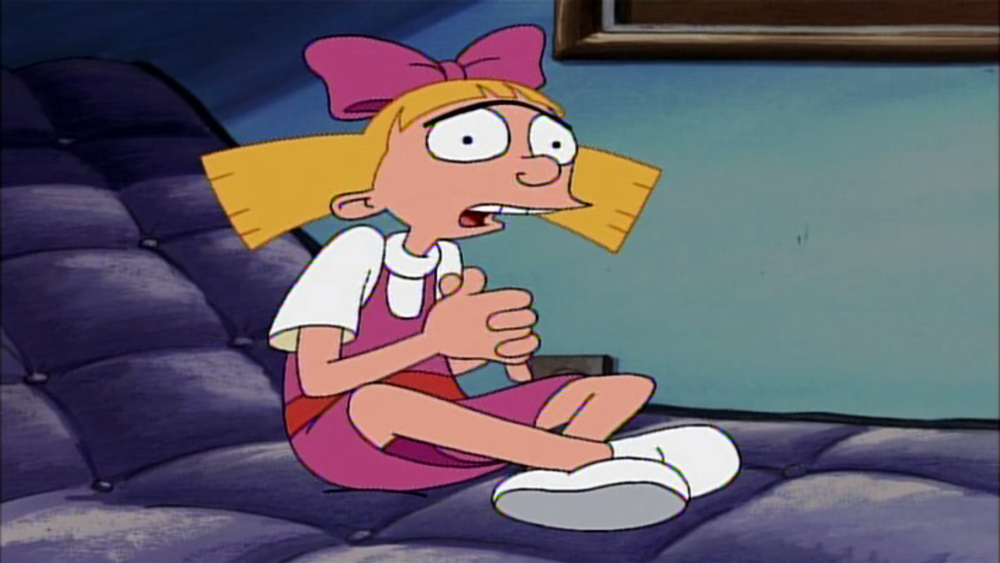
Before therapy, Helga had no outlet to express her anger, save for bullying other kids and nursing an obsessive, secret adoration for Arnold. It’s one of the most compelling quirks of her character, but exploring it through the series’ usual template would demand that she confess to Arnold, the show’s Empathizer in Chief, whose track record includes bringing screw-ups and rejects like Mr. Kokoshka, Sid, Harold, Stoop Kid, Pigeon Man, and dozens of others back from their brink.

On the one hand: How kind he is, how caring, how empathetic. Arnold, our sweet boy. Arnold, Arnold, Arnold! But confessing to her love is just not an option for Helga. In this case, therapy and the layer of confidentiality Dr. Bliss promises pull double duty as storytelling devices—one allows her to confront the anger in her past, while the other gives her the time to process her feelings for Arnold without telling him. The former makes it a great character-driven episode for Helga—one that, it should be said, runs for 22 minutes, twice the length of a standard Arnold! entry. The latter allows Hey Arnold!’s basic rhythms and format to continue ad infinitum for future episodes while staying true to the growth we saw in this one. It’s a deft bit of story mechanics for any show, let alone one aimed at kids.
Compare that to the more dramatic, but relatively less consequential, “reveal” of Helga’s love to Arnold from Hey Arnold! The Movie. It’s climactic and raw and a little sad, but it doesn’t come close to matching the resonance of “Helga on the Couch.” More than anything, Arnold is left confused.
You could never accuse “Helga on the Couch” of the same flaws. It leans more toward the Chuck Jones approach of never allowing Wile E. Coyote to catch the Road Runner. Helga and, consequently, Hey Arnold! simply stop being interesting once Helga tells Arnold how she feels. Her therapist even tells her she doesn’t have to, and the truth is that she doesn’t. (Yet.)
Just as importantly, Helga gets a real, earned win by the end of the show. We leave her lighthearted, clearheaded, and committed to doing good for a day. She doesn’t even hit Brainy when he turns up again! Progress.
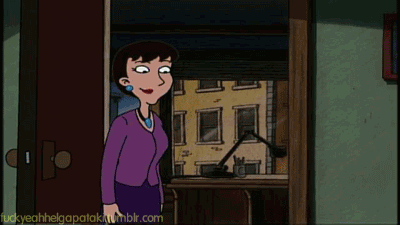
If you liked this story, sign up for our newsletter.
Thanks for reading The Dot and Line, where we talk about animation of all kinds. Feel free to follow us on Twitter and Facebook.


